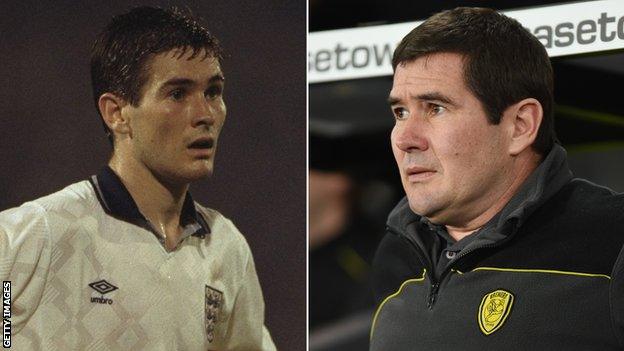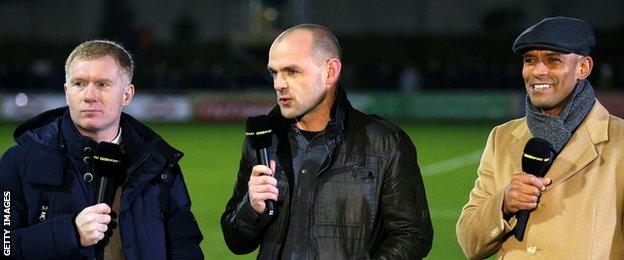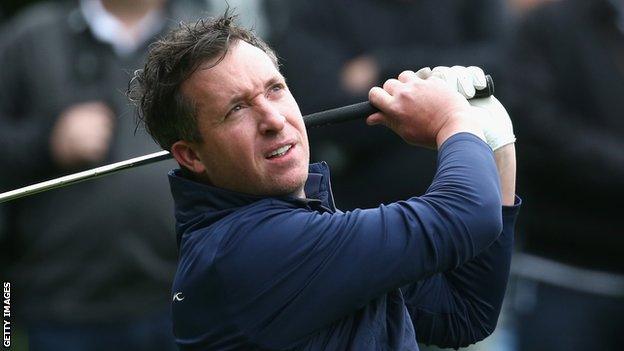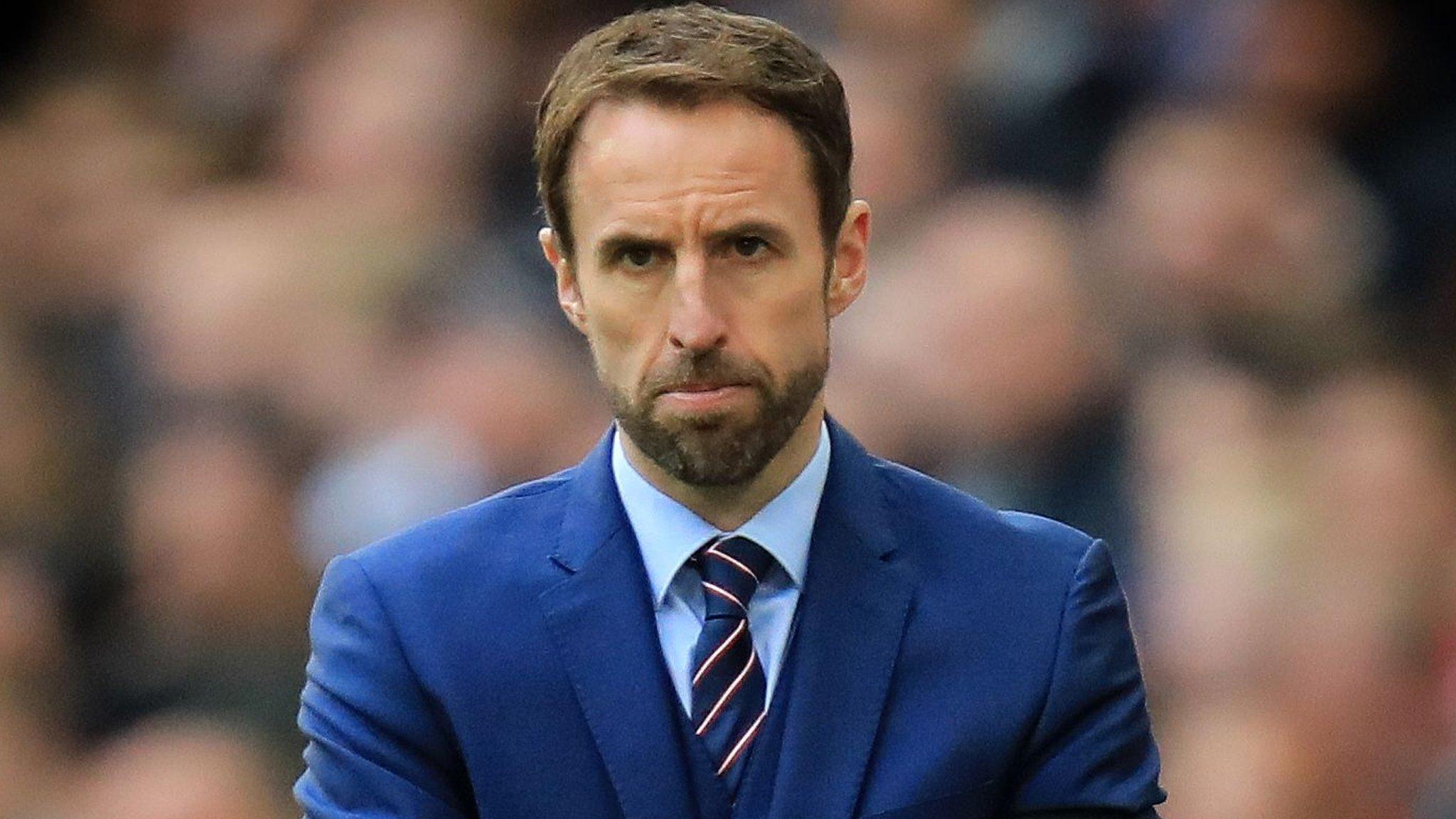Football Association 'ups ante' as it tries to keep ex-England players in football
- Published
- comments

Nigel Clough made 14 appearances for England and has since managed Burton (twice), Derby and Sheffield United
Only one manager in England's top two leagues has won a full England cap - Burton's Nigel Clough.
Ten years ago that number was seven, 20 years ago it was nine.
By comparison, 10 former Spain internationals are managing in the top two leagues in their homeland, while seven former Italy players are doing so in Serie A and B.
In Germany and France, the equivalent figures are three and two respectively.
At a time when Steven Gerrard and Frank Lampard, who both gained more than 100 England caps, have just retired, and Ashley Cole, another centurion, is reaching the end of his playing career, the Football Association wants to show there are ways of staying in the game other than the media - and not all of them involve managing.
What is the FA doing?
It rejects as an "urban myth" the notion it is now offering a fast track into management for former England players.
Instead, it creates bespoke programmes that help candidates understand what becoming a coach means - and work out whether it will be something they enjoy.
The FA has also got rid of the ad-hoc method of selecting candidates to study for a Pro Licence, without which you cannot manage at senior level.
Now, in addition to an application form, those hopeful of being selected must submit a video of their coaching philosophy, then attend a two-day assessment centre for psychometric and profiling tests across nine areas deemed to be leadership attributes, including working under pressure. Those who fail can reapply after 12 months but only if they show tangible proof of development.
"Word is getting out across the game that we have upped the ante," says FA head of education Chris Earle.
But the FA's programmes are not just focused on players going into management.
It says there are between 400 and 500 first-team coaching positions and 1,800 in the academy system in the professional game.
Former England captain Gerrard, for example, is taking his first steps towards an intended management career by working as an academy coach at Liverpool.
"We are not saying 'forget those 80 caps', or however many it is," said Earle.
"What we are trying to find out is how well they communicate, how well would they manage in that complicated environment when you are surrounded by noise from the doctors, the physios and the talent ID people. How do you process all the information and still make good decisions?"
Steven Gerrard: Jurgen Klopp, Liverpool's form & old rivalries
What do former players say?
Trevor Sinclair, who won 12 caps and played at the 2002 World Cup, is going through the same Uefa A Licence course as former England team-mate Paul Scholes. He is also a regular pundit on Match of the Day.
Sinclair, who spent a year as assistant coach at non-league Lancaster City,, external said: "Going into a studio and talking about the game might seem easy but there is a certain amount of skill involved to say what you feel about the game.
"Mainly though, it is about opportunity. It seems to be a lot easier to go into TV than it is to get into a football club. I think there is a bit of a fear factor about introducing former players, who have a good name in the game and good experiences, because people who are already settled at those football clubs might start feeling threatened about their own position if the ex-player does comes in and starts making a bit of a name for himself.
"International players have told me they have offered their services for free and it has fallen on deaf ears. There is something not right and I do feel a trick is being missed because it is such a gain for any club or federation to get ex-players involved."

Trevor Sinclair (right) is on the same Uefa A Licence coaching course as fellow former England international Paul Scholes (left)
Former Liverpool forward Robbie Fowler, meanwhile, says he prefers to take the long route to management so no-one can question his right to a job.
Fowler, who won 26 caps, hopes to complete his coaching badges this summer - it has taken him longer to go through the process than the average five years.
The 41-year-old was on the verge of completing his B Licence, the first step towards a Pro Licence, when he joined Australian side North Queensland Fury in 2009, external.
As he did not return to England for two years, he had to start the whole process again.
He said: "I want to do it on my own merit. If you cut corners, questions will be asked."
Fowler is realistic about where he is likely to enter management, saying: "I don't think anyone in the Premier League or Championship would touch me."
And he is acutely aware of the fact only 11 of the 92 managers in the Premier League and EFL have been in their jobs for longer than four years.
But he added: "There are only so many games of golf you can play.
"I've worked hard for a number of years to get where I am now. Hopefully people will see I am really serious."

Robbie Fowler is keen to get off the golf course and into the dug-out
What will the FA judge as success?
For all the strengthening it is doing across its coaching programmes, the FA knows judgement will come through what happens at the top end of the game.
In November, Gareth Southgate was appointed England boss on a full-time basis having previously led the under-21 team.
Before becoming part of the international set-up, his only managerial experience was his three-year spell at Middlesbrough, who were relegated under him in 2009.
Earle said: "The number one aim is to have more English managers, or managers who have gone through this process, in the Premier League.
"The second is around succession planning for England managers. Can we add anything - foreign language, finance - that would be of benefit to the people we speak to when Gareth Southgate eventually decides to stand down."
- Published26 March 2017

- Published26 March 2017
